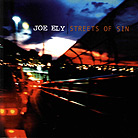October 2003
The third track, though slower than the first two, is where the album picks up. "Flood on Our Hands" builds from concrete details -- "Get out the buckets / And the pots and pans / Mama put the pictures / In the old wooden boat / Billy get the baby / and mama’s overcoat" -- to a survival metaphor such as only such clear images can provide. The refrain, "We got a flood on our hands / The rain’s gonna keep comin’ down," is twice preceded by, "Like Noah of old / Was put to the test / to see if his faith / Was deeper than the rest." Combining elements of country, rock, and blues, several tunes echo the biblical and spiritual notes struck in "Flood on Our Hands." The title track revisits the eternal struggle of the Prodigal Son: "Would you open your screen / Let a poor boy in / If I come back home / Off the streets of sin." Unlike older versions of the story, this one features a DC9 as one possible way home. Yet Ely’s purely secular work has depth, too. "95 South," another of many involving travel, drops Noah, sin, and other religious references and compellingly connects highway potholes, craters on the moon, and "a big empty hole" in the singer’s heart. I especially like "That’s Why I Love You Like I Do," an Ely lyric to the tune of the old spiritual "Lonesome Valley" ("You got to walk that lonesome valley / …You got to walk it by yourself"). It benefits from acknowledging the original song yet diverging significantly, replacing with another’s love the soul’s standing alone on judgment day. "Because you walked / That lonesome valley / Because I met you in your town / Because you saw stars in the alley / …That’s why I love you like I do." Gentle Cotten picking on electric guitar also subtly marks this as a 21st-century version. Rhythms and tempos vary throughout this album much more than chord progressions, instrumentation, or arrangements do. That approach works, since the talented band provides many special touches and carries the tunes along without getting in the way of Ely’s seasoned singing voice. Personnel includes Gary Harman on bass, Rob Gjersoe on several members of the guitar family, Rafael Gayol on drums and percussion, Joel Guzman on keyboards and accordion, David Grissom on electric guitar, and Chris Searles on sizzle cymbals and percussion. These musicians provide a tight, unified sound for Ely, who plays enough instruments himself to make a one-man band had he chosen to do so. Slightly annoying is how much Ely sounds like Bruce Springsteen at times, as in pronouncing "town" and "down" almost as "tan" and "dan." Their two voices are similar in range and timbre, and it’s unlikely that a veteran like Ely is imitating The Boss -- it may be coincidence. It stands out because it’s not something Ely does in every song. All in all Ely’s strong songwriting puts this album a notch above the countless competent rock albums released every year in this over-crowded, not-so-lonesome valley. GO BACK TO: |
 Joe Ely - Streets of Sin
Joe Ely - Streets of Sin Streets of Sin,
the first studio album released by singer-songwriter Joe Ely in six years and his 15th
since starting out three decades ago with the influential Flatlanders, is a much stronger
collection of songs than it first seems. I find the disc ill served by its first two
tracks -- impassioned, up-tempo, and skillfully performed but ultimately vague tunes about
desperation whose sources and outcomes are not defined. The second of them, though, offers
more interesting detail than the first -- important since Ely wrote the second and nine
more of the 12 on the CD but not the first.
Streets of Sin,
the first studio album released by singer-songwriter Joe Ely in six years and his 15th
since starting out three decades ago with the influential Flatlanders, is a much stronger
collection of songs than it first seems. I find the disc ill served by its first two
tracks -- impassioned, up-tempo, and skillfully performed but ultimately vague tunes about
desperation whose sources and outcomes are not defined. The second of them, though, offers
more interesting detail than the first -- important since Ely wrote the second and nine
more of the 12 on the CD but not the first.